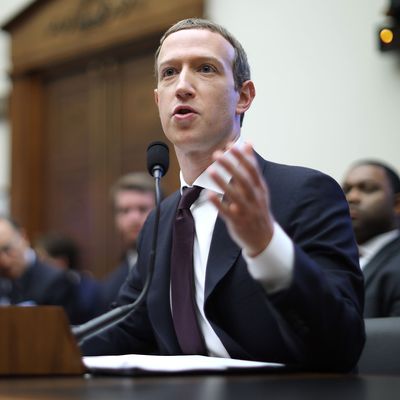
Earlier this month, Facebook caught flack for its decision to not fact-check political advertising. It is not the role of Facebook, according to Mark Zuckerberg, to limit the speech of politicians or candidates for political office. He’d much rather take a hands-off approach and let the voters choose. Almost immediately, politicians put that decision to the test, as when Elizabeth Warren ran ads about Zuckerberg endorsing Donald Trump (Zuckerberg has not endorsed a candidate). Other troll ads included the assertion that Republican Senate leader Mitch McConnell supported the progressive Green New Deal.
In defending the policy, Zuckerberg has asserted that the revenue Facebook collects from political advertising is negligible and that banning political ads entirely would not hurt his company’s bottom line. In a call with the press last week, he said, “This controversy is not worth the very small part of our business that this makes up. So, you know, this isn’t about money.”
Then why should Facebook continue letting people run political ads? “I believe that giving people a voice is important, and ads can be an important part of voice,” he said on the same call. “In the political system, if you’re a challenger candidate or an advocacy group that might not otherwise be covered by the media, ads are an important way to be able to get your message out in front of some people.”
In regards to Facebook, this is something of an understatement: On Facebook, buying ads is the only way to get your message in front of people.
In early 2018, Facebook announced it was changing the News Feed algorithm to favor posts from friends and family over those from Pages and brands. “We’ve gotten feedback from our community that public content — posts from businesses, brands, and media — is crowding out the personal moments that lead us to connect more with each other,” the CEO wrote at the time.
The result of this change was a significant reduction in organic reach, the metric that quantifies how many people see a post for free because they follow a page or a friend shares it. The opposite of this is paid reach, which quantifies how many people see a post because its placement in the News Feed was paid for.
In early 2018, when the algorithm change went into effect, a marketing exec explained to Digiday that “organic reach for some smaller business Facebook pages (fewer than 10,000 fans) has hovered around ten percent for some time.” That means ten percent of a page’s followers would see a post on that page appear in their News Feed if the page didn’t buy sponsored posts. If you were a local candidate, you might have one of these smaller pages. Following the friends-and-family change, that organic-reach number dropped to “virtually zero.”
Put another way, it is basically impossible for anyone running a Facebook page to reach their audience — people who have deliberately clicked the “Follow” button — without paying Facebook for the privilege. Depending on your perspective, Facebook is either a tollbooth or an extortion racket. Organic reach has gone down, and ad rates have gone up.
Anyone running a political campaign on Facebook hoping to reach voters is forced to buy ads. Otherwise, the campaign might as well not exist. That’s why the Trump campaign is spending so heavily on Facebook, and more so than any other campaign by a significant margin: More money equals more speech.
What’s important to note is that there is no longer some theoretical middle ground between all and nothing when it comes to posting on Facebook. Banning political ads there would effectively get rid of all campaigning on Facebook. The possible effects of such a decision are a big unknown.





























